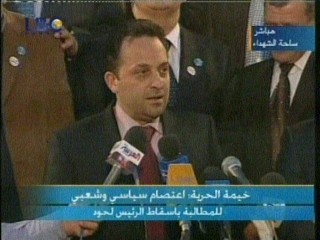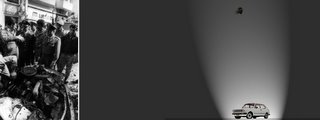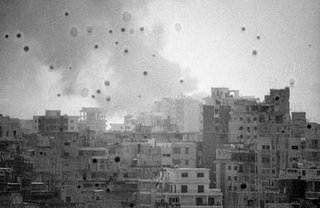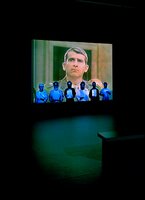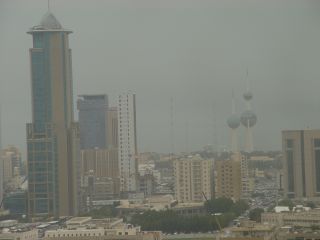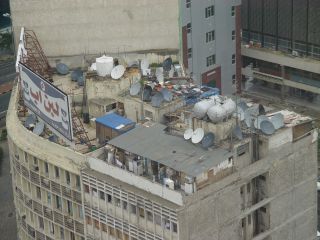The not-so-clean United Arab Emirates?
Don't jump to conclusions, but there are ties between the UAE, bin Laden, and the Taliban
by James Ridgeway
February 22nd, 2006 9:42 AM
WASHINGTON, D.C.—No matter what Bush and his supporters say, there is indisputable evidence of tight connections between the United Arab Emirates and leadership of both the Taliban and Al Qaeda. The country is the center of financial activity in the Persian Gulf, and has next to no laws controlling money laundering.Two of the hijackers came from the UAE and hijacker money was laundered through the UAE. The details are spelled out in documents in the government's case against Moussaoui.
The ties with bin Laden and the Taliban reach far back into the '90s. Prominent Persian Gulf officials, including members of the UAE royal family, and businessmen would fly to Kandahar on UAE and private jets for hunting expeditions, the Los Angeles Times reported in 2001. In addition to ranking UAE ministers, these parties included Saudi big wigs like Prince Turki, the former Saudi intelligence minister who now is ambassador to the U.S.
General Wayne Downing, Bush's former national director for combating terrorism, was quoted on MSNBC in September, 2003 saying, "They would go out and see Osama, spend some time with him, talk with him, you know, live out in the tents, eat the simple food, engage in falconing, some other pursuits, ride horses. One noted visitor is Sheik Mohammed bin Rashid al Maktum, United Arab Emirates Defense Minister and Crown Prince for the emirate of Dubai.''
Bin Laden and Taliban leader Mullah Omar joined the hunting parties, and there are suspicions Al Qaeda and Taliban personnel are smuggled out on returning flights.
Here is one report, sourced to the 9-11 Commission, appearing in Paul Thompson's 9-11 timeline:
"February 1999: Bin Laden Missile Strike Called Off for Fear of Hitting Persian Gulf Royalty. Intelligence reports foresee the presence of bin Laden at a desert hunting camp in Afghanistan for about a week. Information on his presence appears reliable, so preparations are made to target his location with cruise missiles. However, intelligence also puts an official aircraft of the United Arab Emirates (UAE) and members of the royal family from that country in the same location. Bin Laden is hunting with the Emirati royals, as he did with leaders from the UAE and Saudi Arabia on other occasions (see 1995-2001). Policy makers are concerned that a strike might kill a prince or other senior officials, so the strike never happens. A top UAE official at the time denies that high-level officials are there, but evidence subsequently confirms their presence. (9-11 Commission Report, 3/24/04 (B))"
It remains a key center of operations for Victor Bout, the notorious arms dealer, with ties to Taliban and Al Qaeda. There were also ties to the infamous BCCI.
As the Financial Times put it, in the UAE, "Western fraud investigators may find a link here or a connection there, with a person suspected of breaking western laws. But in Dubai, and its neighbor Sharjah, trails tend to vanish like wind-blown tracks in desert sands . . . Secrecy keeps everyone guessing—and speculating . . . 'Medieval feudalism' is how one senior western banker described Dubai's style of government, 'with a veneer of 21st century regulations.' "
A Russian arms merchant funnels money, guns, and dope through the United Arab Emirates
by James Ridgeway
February 23rd, 2006 11:09 AM
by James Ridgeway
WASHINGTON, D.C.—To hear the administration and its supporters talk, you'd think the workers in New York ports are carefully vetted by the Waterfront Commission, the ports themselves protected by the ever watchful Coast Guard, and routinely surveilled by U.S. Customs.
In truth,one administration after another has slashed the operational capability of the Coast Guard. Reagan even contemplated its privatization by a major defense firm. As for the Customs Service, it inspects as little as 5 percent of the cargo going through the New York ports.
This is a dream setup for any arms or dope dealer, and that's exactly what the United Arab Emirates is all about.The ties between its top officials and royal family with the Taliban and Al Qaeda go back at least a decade.
The UAE is not only the center of financial dealings in the Persian Gulf, it is switching central for dope and arms dealing. The dope comes out of Afghanistan into the UAE where tax monies are collected and used to buy arms, which were sent back in for the Taliban. Some of this money is thought to have helped finance the 9-11 attacks. A money trail is set forth in the government's filings in the Moussaoui case.
Long at the center of this operation is the mysterious Russian arms dealer, Victor Bout. The U.N. has accused Bout of providing arms to brutal regimes in Sierra Leone,Angola and to Charles Taylor in Liberia. The Center for Public Integrity, a Washington, D.C. research organization that operates a network of foreign correspondents, published a report on Bout in January 2002, citing Belgian intelligence documents from before the 9-11 attacks it had obtained. These documents reportedly show Bout earned $50 million in profits from selling weapons to the Taliban after they came to power in the late 1990s. The Center states, "Another European intelligence source independently verified the sales, and intelligence documents from an African country in which Bout operates—obtained by the Center—claim that Bout ran guns for the Taliban 'on behalf of the Pakistan government.' " Peter Hain, the British Foreign Office Minister for Europe who has led the international effort to expose criminal networks behind the conflict diamonds and small arms trade in Africa, told the Center's reporters, it was clear that Bout's supply of weapons to the Taliban "and to its ally, Osama bin Laden" posed a real danger.
Der Spiegel, the German magazine, said in early January 2002 that Vadim Rabinovich, an Israeli citizen of Ukrainian origin, along with the former director of the Ukrainian secret service and his son sold a consignment of 150 to 200 T-55 and T-62 tanks to the Taliban. Spiegel said the deal was conducted through the Pakistani secret service and uncovered by the Russian foreign intelligence service, SVR, in Kabul, the Afghan capital. A Western intelligence source told the Public Integrity Center that Rabinovich's weapons had been airlifted by one of Bout's airfreight companies from his base in the UAE.
Rabinovich denied all this, and Bout said "For the record, I am not, and never have been, associated with Al Qaeda, the Taliban, or any of their officials, officers, or related organizations," Bout said, according to a copy of the statement released in the United States by one of his associates. "I am not, nor are any of my organizations, associated with arms traffickers and/or trafficking or the sale of arms of kind [sic] anywhere in the world. I am not, nor is any member of my family, associated with any military or intelligence organizations of any country."
No one is suggesting Bout has any great love for the radical Muslim fundamentalists of Taliban ilk. He sold guns to the Russians fighting the CIA-backed Afghan mujahideen in their war with the Soviet Union and to the warlords opposing the Taliban. His planes are registered to various companies all operating out of the United Arab Emirates.
In fact, the United Arab Emirates have been viewed as hub for trade going and coming to Afghanistan, with drugs coming from Afghanistan on their way to the West, and weapons from Bout, going back. While transportation was via Bout's different air cargo interests, it also involved the Afghan state airlines, called Ariana Airlines. The airline was controlled by Al Qaeda. Al Qaeda agents masquerading as Ariana employees flew out of Afghanistan, through Sharjah, one of the emirates, and on to points west.
During the late 1990s Bout's center of operations was Ostend, Belgium, but when he came under pressure there, he left Belgium. The UAE office grew in importance.
Bout used various air cargo outfits. One of them was called Flying Dolphin, which in the early 2000s was owned by Sheikh Adbullah bin Zayed bin Saqr al Nayhan, a former UAE ambassador to the United States and member of the ruling family in Abu Dhabi. He was described by the United Nations as a "close business associate of Bout." According to the December 20, 2000, U.N. report, Zayed's company is registered in Liberia, but its operations office is in Dubai.

